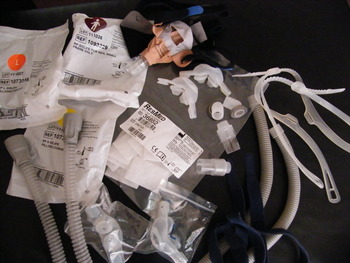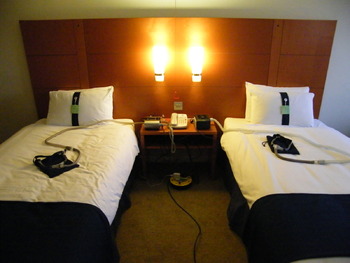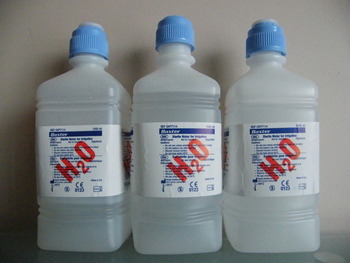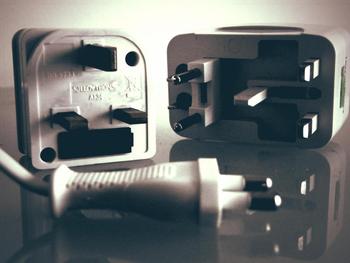It's all very well making sure that your xPAP machine is set up nicely at home, in a good place beside your bed with the wires and tubing just how you want them, but it's another thing to get it right when you travel.
Over the years of travelling with my son's BiPAP and now with my CPAP coming along for the ride too, we've picked up a few tips that have helped - some of which we've learnt the hard way.
Spares
These are self explanatory. If you have a spare breathing circuit then take it with you when you travel. Yes, they take up valuable space in your baggage but that's better than wishing you'd packed them. They don't have to be new, you could take along an old but still functioning set that you have.
I take our old masks and tubing and sterilise them before we travel. I'll make a post about how I do this shortly.
We also take a spare BiPAP machine with us. That has the advantage of being able to operate in BiPAP and CPAP modes (although sadly not Auto CPAP / APAP) modes, so it could serve as a backup for either of us.
A small roll of Duct Tape is a good travelling companion as it can be used to make on the spot repairs to punctures.
Extension Lead
Don't leave home without it!
For some unknown reason many hotels seem to only provide one power socket in the bedroom and it's located by a desk across the room. This is useless for plugging your PAP machine into as it's so far from the bed. So you'll need an extension lead in order to prevent a night of sleeping up the wrong end of the bed and balancing the CPAP machine on a suitcase, or dragging the bed across the room towards the power point.
I use a 10 metre coiled lead (with thermal cut out and an earth "trip"). I always fully uncoil it when using it. It has 4 sockets on it, which is great as usually we need to charge a phone or a laptop overnight too.
Water
If you use a humidifier, make sure you have suitable water to put in it.
Cooled boiled water is good as the boiling should have killed any bacteria or viruses that were living in the water.
One trip we forgot and the tap water wasn't suitable plus there wasn't a kettle to boil it in. So we went without the humidifiers and were pleasantly surprised at how different it felt to breathe.
Now neither of us use a humidifier, but we may appreciate some warm air when winter comes.
Bottled water (or even some home distilled water) is good to take along for the trip too, even if you get a 2 litre bottle and leave it by the bedside solely for the humidifier and rinsing your mask in the morning.
Essential if you are travelling to a place that uses a different power socket configuration. We use a universal adapter and plug our extension lead into it, giving us 4 UK sockets.
It's a good idea to check the fuse rating too, and avoid those "Shavers Only" adapters as their electrical rating isn't suitable.
Battery Backup
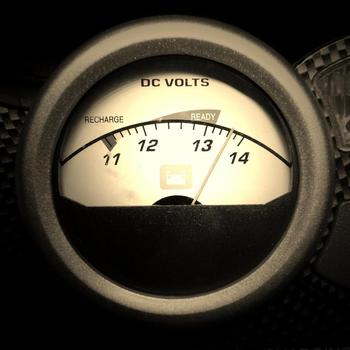 Call me paranoid, but we also take a 12v power supply and the appropriate leads for our PAP machines if we are travelling to a place where the power supply is temperamental. The battery can be anything from one of those car "Jump Start" packs to a dedicated CPAP battery such as the "Super CPAP Battery". The Super CPAP battery can sustain my Resmed S9 Autoset for at least 5 nights using pressures of 7.5 - 14 cmH2O.
Call me paranoid, but we also take a 12v power supply and the appropriate leads for our PAP machines if we are travelling to a place where the power supply is temperamental. The battery can be anything from one of those car "Jump Start" packs to a dedicated CPAP battery such as the "Super CPAP Battery". The Super CPAP battery can sustain my Resmed S9 Autoset for at least 5 nights using pressures of 7.5 - 14 cmH2O.
It's well worth doing some research into the type of battery that you are buying and calculate a rough idea of how long it'll last. Be aware that using a humidifier will draw more power from the battery, hence it won't last as long.
I'm going to be "Wild Camping" in a week or so (tentless camping in the forest) and I'm planning on taking my CPAP with me. (More about that in a post when (if) I return). (Edit - Read about Wild Camping with CPAP here)
A backup battery is a good idea, even if you aren't travelling. One night at home we had a power cut. I only realised because it became harder to breathe, but my son's BiPAP alarmed due to power loss, and his battery backed up Oximeter also sounded an alert.
I was grateful that I had a battery (albeit a car jump charger) and a 12v lead for his BiPAP as his need is far greater than mine, he was back up and running in minutes, whereas I had to resort to side-sleeping for the duration of the power cut.
My uncle (also a BiPAP user due to Post-Polio Syndrome) uses a battery backup all the time when travelling. His system switches to battery backup automatically if there's a power cut. The power supply where he travels isn't only prone to blackouts but it also suffers from "Brown-Outs" where the voltage isn't constant and dips or surges a lot, so his system protects his BiPAP from poor supply at the same time.
Other items that we've needed on our travels have been:
- Fuses (for the plug)
- A power brick transformer specifically for your PAP machine (the Respironics one packed up one night, so we used the one from the spare BiPAP)
- CPAP Wipes
The above items are things that I consider essential, although some only apply in certain circumstances. Each person will find the things for them that they consider essential. Some people use clips to hold the CPAP hose while they sleep, some use a dedicated holder, some will need a humidifier (and a spare) and I dare say that there are other things that people use that I haven't even considered.
